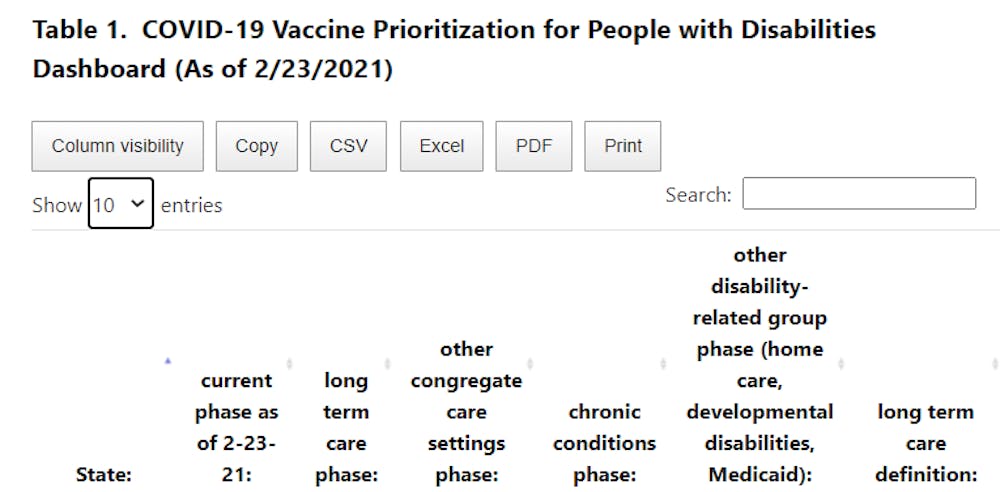In a collaborative effort between the Hopkins Disability Health Research Center and the Center for Dignity in Healthcare for People with Disabilities (CDHPD), the COVID-19 Vaccine Prioritization Dashboard was recently launched to help people with disabilities and underlying conditions determine whether they are eligible for vaccination in their home state.
The dashboard tracks the plans of all 50 states, U.S. territories and Washington, D.C. regarding vaccine distribution and eligibility to people in four categories: those in long-term care settings, those in congregate care settings, people with chronic conditions that make them more susceptible to severe COVID-19 and those in other disability-related groups. The dashboard is updated every Wednesday with new information from state health departments.
The idea for the dashboard came from senior Public Health Studies major Sabrina Epstein, who was frustrated with the inconsistencies she saw in vaccine rollout policies.
“As a high-risk chronically ill person, I saw different states defining the phase that I expected to fall into differently, as well as placing high-risk individuals at different stages of prioritization,” Epstein said in an interview with The News-Letter. “In connecting with others in the disability community, I realized this issue extended far beyond my personal struggle. I wanted to create a tool to help disabled people identify when they qualify for a vaccine in their state and to equip advocates with data to fight for more equitable vaccine plans.”
Epstein, an intern at the Disability Health Research Center, reached out to her mentor Bonnielin Swenor, the center’s director, to suggest creating a dashboard.
The two then contacted Dr. Megan Collins, an assistant professor of ophthalmology at the School of Medicine and the creator of the COVID-19 vaccination tracker for the prioritization of teachers, to learn about some of the ins and outs of launching a vaccination dashboard.
Eventually, Epstein and Swenor partnered with Kara Ayers at CDHPD to take on the project. After approximately two weeks, the dashboard went live on Feb. 8.
A team of five people obtained the information for the dashboard by manually extracting information from states’ health websites.
In addition to helping people with disabilities become vaccinated, the team hopes that the tool will provide disability advocates with data to fight inequalities in distribution.
“From the start, we hoped that this vaccine dashboard would allow people with disabilities, families, advocates, policymakers and stakeholders to more easily compare the prioritization of people with disabilities across states,” Swenor said in an interview with The News-Letter. “We also quickly realized there was a gap in the accessibility of many state websites and our dashboard, which provides this information in accessible formats and also provides this information to people who may otherwise not have access.”
By updating the tool weekly, the team has seen how different states prioritize people with disabilities differently in the vaccination line. Connecticut and Nebraska recently deprioritized people with disabilities by moving to an age-based prioritization system, while New York and D.C. have recently created plans to prioritize those in “high-risk” categories.
Epstein has received an exciting response from the disability community to the dashboard, which receives about 1,000 visits a day. Recently, the National Council on Disability and the Disability Rights Education and Defense Fund cited the dashboard in their work to create a more equitable vaccine response.
Swenor and Epstein have plans to update and expand the dashboard in the near future.
“I am working to expand the dashboard by adding accessible data visualization components and am working to find partners that will allow us to track aspects of accessibility of state vaccine information,” Swenor said. “I also have plans to use this information to examine relationships between public health, pandemic policies and social measures associated with vaccine prioritization for the disability community.”
The team has recently expanded, and it currently includes four members from the Disability Health Research Center, including Swenor and Epstein; two members from the Kennedy Krieger Institute; and three members from CDHPD. Swenor serves as the main overseer of the project, while Epstein manages most day-to-day management and weekly updates.
Epstein believes that inequalities in vaccine rollout highlight the need for more people with disabilities as leaders in public health.
“As a disabled person, I was able to use my personal experience to identify this major gap in the vaccine rollout, and based on the response, this was clearly a needed tool,” Epstein said. “Disabled people cannot be an afterthought in the COVID-19 response.”





